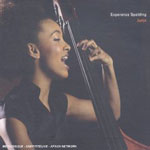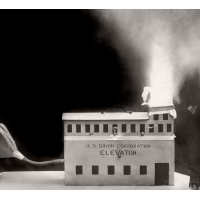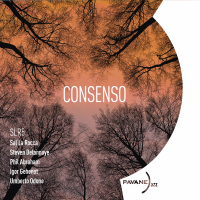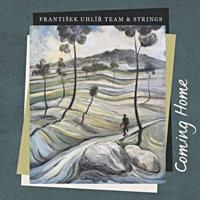Home » Jazz Articles » Extended Analysis » Jim Pepper & Amina Claudine Myers: Afro Indian Blues
Jim Pepper & Amina Claudine Myers: Afro Indian Blues
In 1991, at the time of the gig, Pepper was already sick with the cancer that would kill him within the year. But he's in strong form throughout, delivering his signature "Witchi Tai To" with a freshness that belies two decades of performing it on stage. Pepper had learned from the masters before him—Ornette Coleman, Don Cherry, Miles Davis, Albert Ayler, Charlie Parker and, perhaps most of all, John Coltrane—to play the lines that lay behind the lines, as well as the spaces between the notes.
Myers for her part mesmerizes with her piano and vocal accompaniment. She brings us into the world of latter day "Witchi Tai To"—an anthem for stylists of all stripes, from all cultures and from all over the world.
"Witchi Tai To" is actually the third of four songs on the CD. The second cut is another of Pepper's classics, "Comin' And Goin.'" Myers crafts a subtle accompaniment behind Pepper, until he turns the attention on her and she delivers a powerful solo (that sounds like it brings the audience to its feet.) While Pepper sings "It's good where we've been/And where we're going," Myers' piano actually takes us to those places.
Bracketing these two Pepper compositions are Billie Holiday's "Fine And Mellow" and Myers' "African Blues." Both provide ample evidence of Myers' artistic and technical maturity, craftsmanship, and emotional range—vocally, as well as on the keyboard.
Oddly enough, the CD doesn't credit Holiday for "Fine And Mellow," titling it simply as "The Blues," and classifying it as "traditional." Myers' delivery is clean and direct, and its simplicity packs power. Every word, every syllable, every vowel and consonant is given its place. And between the sung lines, Pepper responds with some of the finest tenor sax blues riffs you'll hear anywhere. In her solo, Myers treats each note just as meticulously as she does the lyrics. In the meantime, bassist Anthony Cox smoothly maintains the pace, and remains in impressive control of his instrument, punctuating his own solo with solid slaps and bent notes as he struts through his lines.
"African Blues," the final cut, offers another chance for Myers to mesmerize us with her piano playing and enrapture us with her chanting vocal style. She begins with a harp-like introduction that sets the stage for a lilting, yet powerful composition. Whether she's singing words, vocalizing sounds, or mixing both, she knows how to tell a story with her music. On percussion, Leopoldo Fleming is judiciously sparing until it's his turn to take flight with a solo that's absolute, total music—he plays the melody on his drums, not just a riff on the rhythm. You can almost hear the distant echo of Myers' singing below the drums. Don't be fooled towards the end of Fleming's solo. That's not him stepping aside to let Cox slip in a few bars on his bass. Those deep notes are Fleming's fingertips rubbing the skins of his congas.
On the downside, the lack of any liner notes is a huge disappointment. No background info, no back story, no acknowledgements, nothing but the obligatory song titles (and one of those plain wrong), along with a couple of dark photos and basic recording information. After fifteen years, you'd think the label could have found someone with something to say about the event, the music and the musicians. It's a shame insufficient effort went into the packaging of such high caliber music.
This collaboration is a great way to introduce yourself to Amina Claudine Myers and Jim Pepper—and particularly, to the natural and easy chemistry between two progressive artists, as they make their way through a barely (if at all) rehearsed repertoire of classic blues and jazz, along with their own edgy compositions. Both musicians honed their skills through the turbulent '60s and '70s, so shattering the contentions of self-proclaimed historians like Ken Burns, Wynton Marsalis, Stanley Crouch, et al, who'd have us believe that jazz evolution ended with Duke Ellington.
Speaking of the power of both African and Native American music, Pepper once said, "It comes up from the ground." The music on Afro Indian Blues is about what brings us together as human beings. It reminds us that we come from—and return to—the dirt that we stand on, the rivers that we wade through, the trees that we walk among.
It's not about how far the blues have come from their African roots, or about how far Pepper took his grandfather's ritual music from the reservation. It's about how close to home the music and its spirit remain, no matter what changes they go through or how far they travel. And it sure helps to have the kind of soundtrack that Pepper and Myers provide for the journey home.
Track Listing
The Blues (Fine And Mellow); Comin' And Goin'; Witchi Tai To; African Blues.
Personnel
Jim Pepper
saxophone, tenorAmina Claudine Myers
pianoAnthony Cox
bass, acousticLeopoldo F. Fleming
percussionJim Pepper: tenor saxophone, vocals; Amina Claudine Myers: piano, vocals; Anthony Cox: bass: Leopoldo Fleming: percussion.
Album information
Title: Afro Indian Blues | Year Released: 2006 | Record Label: PAO Records/ SBF Records
Tags
PREVIOUS / NEXT
Support All About Jazz
 All About Jazz has been a pillar of jazz since 1995, championing it as an art form and, more importantly, supporting the musicians who make it. Our enduring commitment has made "AAJ" one of the most culturally important websites of its kind, read by hundreds of thousands of fans, musicians and industry figures every month.
All About Jazz has been a pillar of jazz since 1995, championing it as an art form and, more importantly, supporting the musicians who make it. Our enduring commitment has made "AAJ" one of the most culturally important websites of its kind, read by hundreds of thousands of fans, musicians and industry figures every month.


























